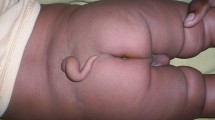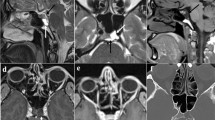Abstract
Background
A prospective study on childhood craniopharyngiomas (CPs) was conducted from 1994 to 1998 to appreciate the pre- and postoperative clinical, endocrine, mental, and intellectual status of the patients and to determine the incidence and severity of the postoperative hypothalamic syndrome.
Methods
The series included 14 consecutive CPs. Twelve were retrochiasmatic and intraventricular, and two were partly prechiasmatic and extraventricular. All were treated with the aim of “total” removal. The removal was “total” in nine cases but incomplete in the other five. Immediate postoperative follow-up was uncomplicated in all cases.
Conclusion
At 2-year follow-up, the two children with an extraventricular CP and a “total” tumor removal were intellectually normal, had no hypothalamic syndrome, and attended normal school with good results. The 12 others, although still intellectually normal, were more or less severely affected by a hypothalamic syndrome which altered their social insertion and caused academic failure. The authors conclude from this study that radical surgery should be reserved to extraventricular CPs only.





Similar content being viewed by others
References
Assal LG, Campicher J, Thuilard F (1980) Amnestic syndrome in children: observation of a girl after craniopharyngioma operation. Schweiz Arch Neurol Neurochir Psychiatr 127:189–197
Bray GA, Gallagher TF (1975) Manifestations of hypothalamic obesity in man: a comprehensive investigation of 8 patients and the review of the literature. Medecine 54:301–330
De Vile CJ, Grant DB, Kendall BE, Neville BG, Stanhope R, Watkins KE, Hayward RD (1996) Management of childhood craniopharyngioma: can the morbidity of radical surgery be predicted? J Neurosurg 85:73–81
Haugh RM, Markesbery WR (1983) Hypothalamic astrocytoma. Syndrome of hyperphagia, obesity and disturbances of behavior and endocrine function. Arch Neurol 40:560–563
Hayward R (1999) The present and the future management of childhood craniopharyngioma. Childs Nerv Syst 15:764–769
Hetelekidis S, Barnes PD, Tao ML, Fischer EG, Schneider L, Scott RM, Tarbell NJ (1993) 20-Year experience in childhood craniopharyngioma. Int J Radiat Oncol Biol Phys 27:189–195
Inoue S, Bray G (1979) An autonomic hypothesis for hypothalamic obesity. Life Sci 25:561–566
Jeanrenaud B (1978) Hyperinsulinemia in obesity syndromes: its metabolic consequences and possible etiology. Metabolism 27:1881–1892
Jeanrenaud B (1985) An hypothesis on the aetiology of obesity: dysfunction of the central nervous system as a primary cause. Diabetologia 28:502–513
Laws ER Jr (1980) Transsphenoidal microsurgery in the management of craniopharyngioma. J Neurosurg 52:661–666
Poretti A, Grotzer MA, Ribi K, Schonle E, Boltshauser E (2004) Outcome of craniopharyngioma in children: long term complications and quality of life. Dev Med Child Neurol 46:220–229
Reeves GA, Plum F (1969) Hyperphagia, rage and dementia accompanying a ventromedial hypothalamic neoplasm. Arch Neurol 20:616–623
Rilliet B, de Paul Djientcheu V, Vernet O, Montes J, Farmer JP, Bertrand G (1999) Craniopharyngiomas, results in children and adolescents operated through a transsphenoidal approach compared with an intracranial approach. Front Radiat Ther Oncol 33:114–122
Sanford RA (1994) Craniopharyngioma: results of survey of the American Society of Pediatric Neurosurgery. Pediatr Neurosurg 21(Suppl 1):39–43
Scott RM, Hetelekidis S, Barnes PD, Goumnerova L, Tarbell NJ (1994) Surgery, radiation and combination therapy in the treatment of childhood craniopharyngioma. A 20 year experience. Pediatr Neurosurg 21(Suppl 1):75–81
Skorzewska A, Lal S, Waserman J, Guydah V (1989) Abnormal food seeking behaviour after surgery for craniopharyngioma. Neuropsychobiology 21:17–20
Tonkogony JM, Geller JL (1992) Hypothalamic lesions and intermittent explosive disorder. J Neuropsychiatry Clin Neurosci 4:45–50
Wisoff JH, Sands S, Moliterno J, Milner J (2003) Functional outcome following radical resection of primary and recurrent craniopharyngioma. Childs Nerv Syst 19:624
Yarde WL, Kepes JJ, O’Boynick P (1995) Craniopharyngioma presenting as a Korsakoff psychosis. Kans Med 96:22–23
York D, Bray GA (1972) Dependence of hypothalamic obesity on insulin, the pituitary and the adrenal gland. Endocrinology 90:885–894
Author information
Authors and Affiliations
Corresponding author
Rights and permissions
About this article
Cite this article
Pierre-Kahn, A., Recassens, C., Pinto, G. et al. Social and psycho-intellectual outcome following radical removal of craniopharyngiomas in childhood. Childs Nerv Syst 21, 817–824 (2005). https://doi.org/10.1007/s00381-005-1205-6
Received:
Published:
Issue Date:
DOI: https://doi.org/10.1007/s00381-005-1205-6




